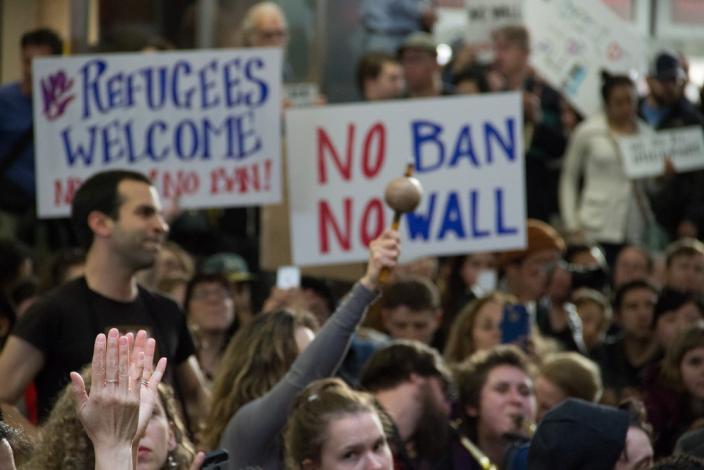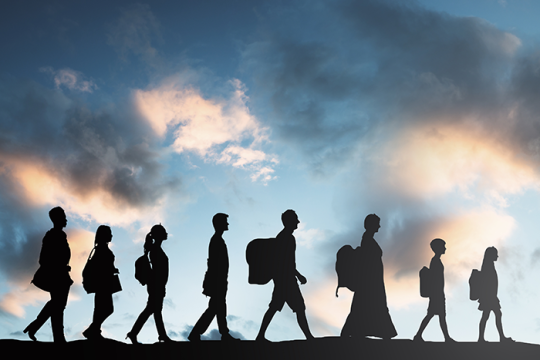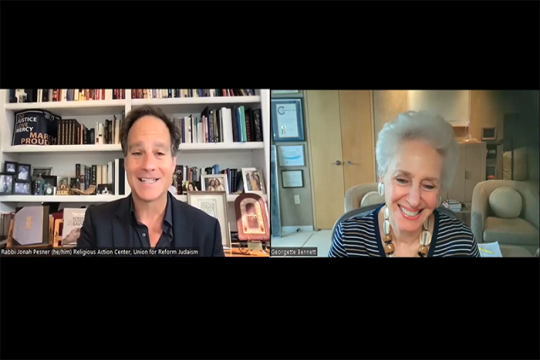Opposing the Travel Ban: Why My Jewish Values Compel me to Welcome Refugees

As a high school student in Washington, DC, I have heard firsthand accounts from my peers of how anti-refugee sentiment has affected them and their families. I have had conversations with fellow students who tell me their families are no longer able to visit them and feel wary of when they’ll next get to see their loved ones. I have also discussed with friends their fear of being Muslim in America with recent rhetoric used to depict their religion and members of their community. While there are over 65 million men, women, and children who experience displacement as refugees worldwide, these are just a handful of the people whose families have been affected by new government reforms.
This is why it was so concerning to me when, back in January, President Trump’s first month in office, he instituted a ban on travel from seven countries for 90 days as well as halted the entrance of refugees into the U.S. for 120 days. While the order has since been revised, the Trump administration calls for a decrease in refugees to 50,000 per year, a far cry from the 110,000 that were admitted during President Obama’s final year in office.
There are a number of reasons why this ban is unacceptable. To start, since 1980, there has not been a single terrorist attack carried out by a refugee. Prior to then, all three terror attacks on U.S. soil were committed by Cuban nationals; not one of the six predominately Muslim countries named in the revised ban. This fact dispels the notion that a travel ban halting the entrance of refugees from these countries would protect our nation against terror.
It’s also a mischaracterization that refugees hinder our country economically. In fact, it has been shown that refugees have an overwhelmingly positive impact on the U.S. economy. For instance, the population of those aged 65 and older is expected to nearly double by 2050. Welcoming working age (24 to 65 years old) refugees into the country would remedy this. In fact, 77.1% of refugees are working age compared to just 49.7% of US-born people currently of working age. In addition to being of working age, 13% of refugees in America were business owners and entrepreneurs in 2015. This is higher than the 9% of the American-born population that were entrepreneurs. In that same year, refugee-owned businesses added $4.6 billion to our economy.
It is clear that the travel ban is an immoral document that stands to separate families and foster anti-refugee sentiment. So, it is encouraging to see some attempts to walk back major aspects of the ban. For instance, after the Supreme Court ruled that the travel ban could go into effect, but exempted refugees with a “bona fide relationship,” U.S. District Judge Derrick Watson of Hawaii expanded the definition of “bona fide” to include family members such as grandparents, cousins, and nieces/nephews, among others. In addition, he ruled that refugees who had connections to a U.S. resettlement agency should be exempted from the ban. While the Supreme Court approved the expansion on the “bona fide” definition, it upheld the administration’s guidance that refugee resettlement agencies do not constitute such a relationship. In the fall, the Supreme Court will hear arguments on the travel ban to make a final ruling on the constitutionality of the executive order.
As Reform Jews, we are taught that “when strangers reside with you in your land, you shall not wrong them. The strangers who reside with you shall be to you as your citizens; you shall love each one as yourself, for you were strangers in the land of Egypt” (Leviticus 19:33-34). Due to the prevalence of refugees and welcoming them into the safety of America, this most commonly discussed principle in the Torah should be reason enough to oppose the travel ban.
To help combat this unjust ban against Muslims and refugees in need of help from the Middle East, it’s crucial that we reach out to our members of Congress and urge them to speak out against discrimination and work towards revoking the ban.
Kayla Perkins is a rising senior at The Maret School in Washington, DC and is interning at the RAC this summer.
Related Posts

Supporting Immigrants and Refugees in This Challenging Moment

Creating Community on World Refugee Day

